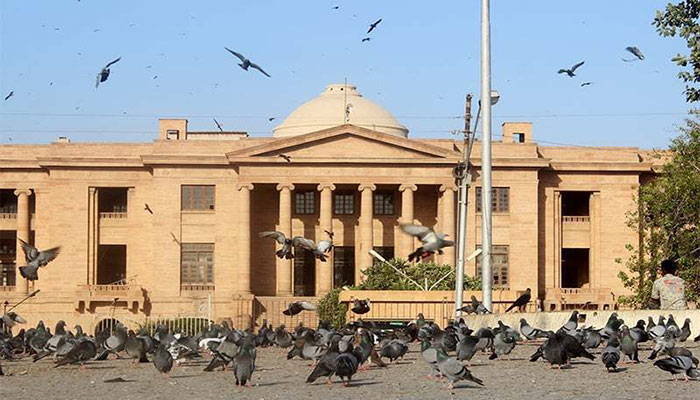SHC directs sessions courts to ensure implementation of juvenile justice law
The Sindh High Court (SHC) on Wednesday directed all the district and sessions judges to ensure implementation of the Juvenile Justice System Act by ensuring disposal of juvenile cases through diversion.
The direction came on a petition of a non-government organisation seeking implementation of the sections 9 and 10 of the juvenile justice system law which bound the police and prosecution to ensure disposal of the juvenile cases through diversion and the juvenile justice committees.
A division bench of the high court headed by Justice Mohammad Ali Mazhar observed that the section 9 of the Act germane to disposal of the cases through diversion, which means an alternative process of determining the responsibility and treatment of juveniles on the basis of their social, cultural, economic, psychological and educational background without resorting to formal judicial proceedings.
The SHC observed that the disposal of cases through diversion shall be referred to the juvenile justice committees and it was further provided in the law that diversion could be exercised at any stage during the course of investigation by the police and during the trial by the prosecution and the court in the prescribed manner.
The high court observed that juvenile justice committees were required to be constituted with the consultation of district and sessions judge for each of the sessions division.
The petitioner’s counsel submitted that a proper disposal of cases through diversion could not be possible until the juvenile justice committees were established in every district of the province.
A provincial law officer and additional home secretary submitted copies of notifications which showed that the juvenile justice committees had been established in 26 districts and the respective notifications issued; however, in three districts, the committees could not be formed and nominations through the district and sessions judges concerned were awaited.
The SHC observed that there was no cavil to the proposition that once the law had been promulgated, it should be implemented in letter and spirit and the government had also notified juvenile justice committees in 26 districts.
The bench observed that it was a responsibility of each of the district and sessions judges to ensure the due compliance with the law and make some mechanism for their districts so that the juvenile justice committee’s meetings should be held regularly for the purpose of the disposal of cases through diversion as provided under the law.
The high court after hearing the arguments of the counsel and provincial law officer disposed of the petition with direction to the district and sessions judges to ensure due compliance with the juvenile justice system law.
The SHC directed the sessions court judges to ensure that juvenile justice committee constituted
by the government with their concurrence shall perform their duties diligently and committee members shall submit compliance reports on a regular basis to the district and sessions judges. The high court
directed that the order of the court be circulated to the district and sessions judges of the province for compliance.
-
 Neve Campbell Explains Why She Avoids Watching Scary Movies As She Returns To 'Scream 7'
Neve Campbell Explains Why She Avoids Watching Scary Movies As She Returns To 'Scream 7' -
 Milan Tram Crash Leaves Two Dead, 39 Injured
Milan Tram Crash Leaves Two Dead, 39 Injured -
 Timothee Chalamet Touches On His Personality's Relatability With 'Marty Supreme' Role
Timothee Chalamet Touches On His Personality's Relatability With 'Marty Supreme' Role -
 Benny Blanco Explains Why His Feet Were Dirty During Podcast Debut
Benny Blanco Explains Why His Feet Were Dirty During Podcast Debut -
 Jake Humphrey Shares The Powerful Meaning Behind His Wrist Tattoo
Jake Humphrey Shares The Powerful Meaning Behind His Wrist Tattoo -
 Matthew Lillard Weighs In On His Return To The 'Scream' Franchise After Decades Of Persistence
Matthew Lillard Weighs In On His Return To The 'Scream' Franchise After Decades Of Persistence -
 Travis, Jason Kelce Share Blunt Dating Advice For Men: 'She's Gonna Hate You'
Travis, Jason Kelce Share Blunt Dating Advice For Men: 'She's Gonna Hate You' -
 Australia To Launch First High-speed Bullet Train After 50-years Delay
Australia To Launch First High-speed Bullet Train After 50-years Delay -
 Meghan Markle Turns To Desperate Bids & Her Kids Are Her ‘saving Grace’: Here’s What They’ll Do
Meghan Markle Turns To Desperate Bids & Her Kids Are Her ‘saving Grace’: Here’s What They’ll Do -
 King Charles Gives A Nod To Sister Anne's Latest Royal Visit
King Charles Gives A Nod To Sister Anne's Latest Royal Visit -
 Christian Bale Shares Rare Views On Celebrity Culture Urging Fans Not To Meet Him In Person
Christian Bale Shares Rare Views On Celebrity Culture Urging Fans Not To Meet Him In Person -
 Ariana Grande To Skip Actor Awards Despite Major Nomination
Ariana Grande To Skip Actor Awards Despite Major Nomination -
 North Carolina Teen Accused Of Killing Sister, Injuring Brother In Deadly Attack
North Carolina Teen Accused Of Killing Sister, Injuring Brother In Deadly Attack -
 Ryan Gosling Releases Witty 'Project Hail Mary' Ad With Sweet Reference To Eva Mendes
Ryan Gosling Releases Witty 'Project Hail Mary' Ad With Sweet Reference To Eva Mendes -
 Teyana Taylor Reveals What Lured Her Back To Music After Earning Fame In Acting Industry
Teyana Taylor Reveals What Lured Her Back To Music After Earning Fame In Acting Industry -
 Prince William Shows He's Ready To Lead The Monarchy Amid Andrew Scandal
Prince William Shows He's Ready To Lead The Monarchy Amid Andrew Scandal




